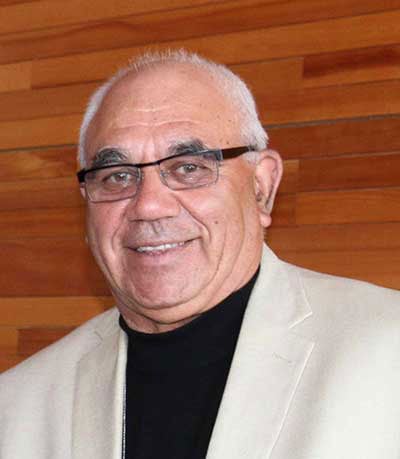Professor Bob Morgan
In an age when our most basic instincts of survival have been tested, and uncertainty is the singular defining characteristic as we struggle to emerge from a pandemic that continues to rage in some parts of the planet, we turn to hope and faith.
During a time when the world has been brought to its knees, a situation that is usually associated with war, or an earthquake, a tsunami or other calamitous events, when the extent of global suffering and loss is at unprecedented levels, the sort that we haven’t experienced since the previous pandemic in 1918; we turn to hope and faith.
The COVID-19 pandemic is indiscriminate, it doesn’t care what colour you are, what culture or heritage you are from, what God you worship, how wealthy or poor you are, although it could be argued that the rich and powerful have greater access to possible remedies.
The pandemic doesn’t care whether you occupy the highest political office, or survive on struggle street, the likelihood is that the virus will find you and cause unmerited pain and misery for those who are infected and those who love them.
The pandemic’s reach is omnipotent, but the great scientific minds of the world are fighting back, and soon we will look back, and hopefully learn what lessons we can take from the experience so that we are better prepared for future pandemics.
The human spirit is as prodigious as it is resilient.
Human induced adversity and pain continues to occur around the world at alarming levels, leaving in its wake broken souls and bodies – and we turn to hope and faith.
Hopefully the vaccines that have been developed will bring protection against the COVID-19 virus, but of course they can’t erase the pain and devastation it has caused.
But another wave of despair will undoubtedly emerge that has the potential to stifle positive post-pandemic development.
The source of this new wave of despair will manifest in a level of mental anguish and illness that will challenge governments and those working in the mental health and wellness industries for years to come.
Growing up in the shanties on the banks of the Namoi River in Walgett, our families made sure we had plenty of distractions to help cope with the mental anguish of living in poverty and social isolation during those segregated times.
One such distraction was music, and the comfort of being cocooned in the loving embrace of family.
On balmy summer evenings, when the heat of day was slowly dissipating, the family would gather to share stories and listen to music; someone would reach for a guitar, a piano accordion or a gum leaf, and we turned to hope and faith.
To help stir our shantytown from sleep, dawn would often be greeted with songs by Patsy Cline, Brenda Lee, Slim Dusty, Jim Reeves, Marty Robbins, and many others, who belted out from an old gramophone – something modern generations would probably find crude and perhaps prehistoric.
Historically music was central to Aboriginal ceremonies and other celebrations.
Didgeridoos, also known as Yadakis by some Aboriginal peoples, clap sticks and other instruments are musical features of corroborees and other ceremonies that are conducted for cultural, ceremonial and/or ritualistic purposes.
In more contemporary times, music is used as a source of entertainment and a means of escape from misery and a tool of survival and celebration.
We turn to hope and faith.
Music serves to remind us of the possibilities that reside in hope and faith and the promise of a life lived in the absence of racism, bigotry and social inequalities.
An increasing body of research tells us that racism is a contributing factor in the health status of Aboriginal and Torres Strait Islander peoples. Research conducted by Professor Yin Paradies from Deakin University points to a strong correlation between racism and a range of mental health conditions that manifest in a variety of ways, including depression, anxiety and unhealthy life choices.
Tragically some people are driven to a point of hopelessness where they choose death over life. In such circumstances we turn to hope and faith.
Racism, in all its forms, and bigotry are like viruses that eat away at the human soul.
Perhaps the work of Professor Paradies and others will one day develop a vaccine to protect against racism, bigotry and social inequalities.
We turn to hope and faith. Hope is a promise – faith is a promise fulfilled.

Professor Morgan is a Gumilaroi man from Walgett western NSW. He is a highly respected and acknowledged Aboriginal educator/researcher who has worked extensively throughout Australia and internationally in the field of Aboriginal knowledge and learning for over forty years.
His involvement and experience with Aboriginal education and training is shaped and influenced by his many years of senior leadership at the state, national and international levels of Aboriginal education policy and programming development.
Professor Morgan is currently Chair of the Board of Aboriginal and Torres Strait Islander Studies, Education and Research (BATSIER) and also serves, as Conjoint Professor with the Wollotuka Institute with the University of Newcastle (UON) Professor Morgan was the founding President of the NSW AECG, a Commissioner with the now defunct NSW Education Commission and he is the inaugural Chair of the Council of the World Indigenous Peoples Conference on Education (WIPCE).




Hope is a feathered thing that perches in the soul.
Faith is for fools.
Sorry Professor, you seem like a decent chap.
Thank you for your care and wise words. Humans seem fearful of raising their consciousness to overcome and socially work for a better world. Faith drives many people, hope is the second cousin and charity the outcome of the process. Keep writing. We need your views.